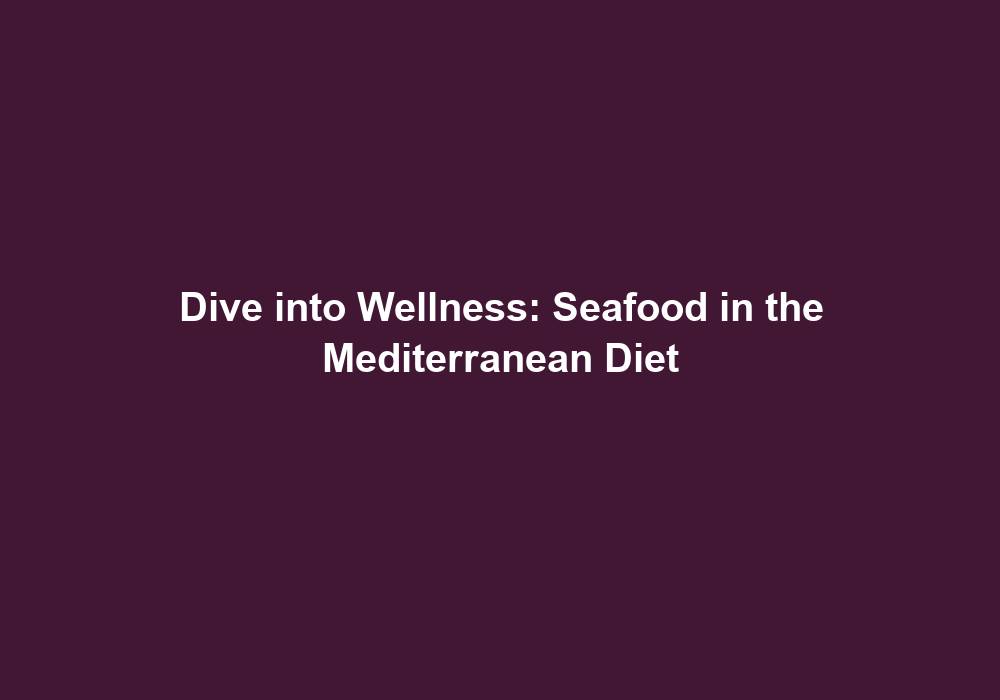Dive into Wellness: Seafood in the Mediterranean Diet
Seafood has long been a staple of the Mediterranean diet, renowned for its numerous health benefits and delicious flavors. This article will explore the many reasons why incorporating seafood into your diet can contribute to a healthier lifestyle. From heart-healthy omega-3 fatty acids to a rich source of vitamins and minerals, seafood offers a wide range of nutritional advantages that can positively impact your overall well-being.
The Mediterranean Diet: A Brief Overview
Before delving into the specifics of seafood, let’s understand what the Mediterranean diet entails. This dietary pattern is inspired by the traditional eating habits of people living in countries surrounding the Mediterranean Sea, such as Greece, Italy, and Spain. It emphasizes consuming whole, minimally processed foods, with an emphasis on fruits, vegetables, legumes, nuts, whole grains, and, of course, seafood.
The Mediterranean diet is not just about the individual components of the diet, but rather the overall pattern of eating. It encourages a balanced approach to nutrition, focusing on the quality of food and the enjoyment of meals. By following this diet, you can adopt a lifestyle that promotes good health and longevity.
Seafood and Heart Health
One of the primary reasons seafood is highly regarded in the Mediterranean diet is its positive impact on heart health. Fish, in particular, is rich in omega-3 fatty acids, which have been shown to reduce the risk of heart disease. These fatty acids help lower cholesterol levels, decrease blood pressure, and reduce the risk of blood clots. Incorporating seafood into your diet can significantly contribute to maintaining a healthy cardiovascular system.
Omega-3 fatty acids are essential nutrients that play a crucial role in heart health. They help improve the function of blood vessels, reduce inflammation, and promote overall cardiovascular well-being. By including seafood in your diet, you can ensure an adequate intake of these beneficial fatty acids.
In addition to omega-3 fatty acids, seafood also contains other heart-healthy nutrients such as potassium, magnesium, and selenium. These nutrients work together to support heart function and maintain a healthy blood pressure. By consuming seafood regularly, you can nourish your heart and reduce the risk of heart disease.
Omega-3 Fatty Acids: The Key Nutrient
Omega-3 fatty acids are not only important for heart health but also play a crucial role in brain function and overall health. They are primarily found in fatty fish such as salmon, trout, sardines, and mackerel. These fatty acids are known to support brain development in infants and provide cognitive benefits in adults.
In addition to their cognitive benefits, omega-3 fatty acids have anti-inflammatory properties that can help alleviate symptoms of arthritis and other inflammatory conditions. They have been shown to reduce joint pain, stiffness, and swelling, improving overall joint health and mobility.
Furthermore, omega-3 fatty acids have been linked to a reduced risk of mental decline and age-related cognitive disorders such as Alzheimer’s disease. By incorporating seafood into your diet, you can support brain health and promote cognitive function throughout your life.
Rich Source of Protein and Essential Nutrients
Seafood is an excellent source of high-quality protein, making it an ideal choice for individuals looking to maintain or build lean muscle mass. Protein is essential for muscle growth, repair, and maintenance, as well as many other vital functions in the body. By including seafood in your diet, you can ensure an adequate intake of protein to support your overall health and fitness goals.
In addition to protein, seafood is packed with essential nutrients such as vitamin D, vitamin B12, iodine, selenium, and zinc. These nutrients are vital for various bodily functions, including immune health, thyroid function, and cell regeneration.
Vitamin D, for example, is crucial for bone health and immune function. It helps the body absorb calcium and promotes the growth and maintenance of strong bones. Vitamin B12 is necessary for the production of red blood cells and the proper functioning of the nervous system. Iodine is essential for thyroid function, which regulates metabolism and growth. Selenium and zinc are powerful antioxidants that support a healthy immune system and protect cells from damage.
By including seafood in your diet, you can benefit from a wide range of essential nutrients that promote overall health and well-being.
Low in Saturated Fat
Compared to other animal protein sources, seafood is relatively low in saturated fat. Diets high in saturated fat have been linked to an increased risk of heart disease and other chronic conditions. By incorporating seafood into your diet, you can enjoy a lean protein source that is both delicious and heart-healthy.
Saturated fat is known to raise cholesterol levels in the blood, increasing the risk of heart disease. By choosing seafood as a protein source instead of red meat or processed meats, you can reduce your intake of saturated fat and promote a healthier heart.
Moreover, seafood contains healthy fats such as monounsaturated and polyunsaturated fats, including omega-3 fatty acids. These fats have been shown to have numerous health benefits, including reducing inflammation, improving blood lipid profiles, and supporting brain health.
Seafood and Weight Management
Including seafood in your diet can also aid in weight management. Seafood is generally lower in calories compared to other protein sources, making it an excellent choice for those looking to lose or maintain weight. Additionally, seafood is rich in essential fatty acids that can help regulate appetite and promote feelings of fullness, reducing the likelihood of overeating.
The protein content in seafood helps increase satiety and reduce hunger, making it easier to control portion sizes and overall calorie intake. The combination of high-quality protein and healthy fats in seafood can also help stabilize blood sugar levels, preventing energy crashes and cravings for unhealthy snacks.
In addition to its weight management benefits, seafood provides essential nutrients that support overall health and well-being. By including seafood in your diet, you can achieve a balanced and nutritious approach to weight management.
Variety and Versatility
Another advantage of incorporating seafood into your diet is the wide variety of options available. From fatty fish like salmon and tuna to shellfish such as shrimp and mussels, there is something for everyone’s taste preferences. Additionally, seafood can be prepared in various ways, including grilling, baking, or even enjoying it raw as sushi. This versatility allows for endless possibilities in creating delicious and nutritious meals.
By experimenting with different types of seafood and cooking methods, you can explore new flavors and textures while reaping the health benefits. Whether you prefer a mild white fish or a rich and flavorful salmon, there are countless recipes and cooking techniques to suit your palate.
Sustainability and Seafood Choices
While seafood offers numerous health benefits, it is essential to make sustainable choices to protect marine ecosystems. Overfishing and destructive fishing practices can have detrimental effects on the environment. When purchasing seafood, look for sustainable options and choose fish that are not overexploited or caught using harmful methods. Organizations such as the Marine Stewardship Council provide certifications to ensure the seafood you consume is sourced responsibly.
By making informed choices and supporting sustainable seafood practices, you can help preserve the ocean’s delicate balance and ensure a future where seafood remains a viable and healthy food option.
Conclusion
Incorporating seafood into your diet following the principles of the Mediterranean diet can be a significant step towards improving your overall wellness. With its heart-healthy omega-3 fatty acids, essential nutrients, and low saturated fat content, seafood offers a plethora of health benefits. From supporting heart health to aiding in weight management and providing a variety of flavors, there are numerous reasons to dive into the world of seafood and embrace its role in the Mediterranean diet.
This article is provided in markdown format for your convenience.







